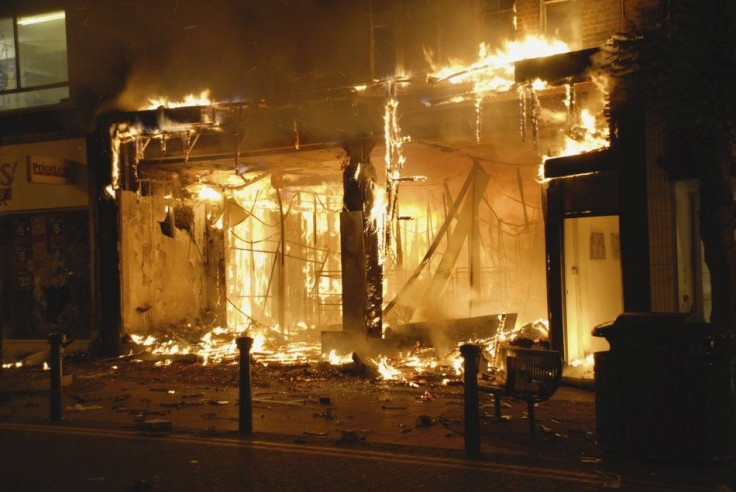London Riots 2011: Nottingham Firebombed Tuesday Night

Sunset on Tuesday marked the forth consecutive night of rioting in London, England and police are forcefully re-engaging with looters in many of the city's peripheral neighborhoods.
Scotland Yard has authorized officers to use plastic bullets when confronting rioters, who have been throwing fire bombs and attacking police for days.
"We have lots of information to suggest that there may be similar disturbances tonight," Commander Simon Foy told the BBC. "That's exactly the reason why the Met [police force] has chosen to now actually really 'up the game' and put a significant number of officers on the streets."
So far, the commander has been proved correct in his assumption. The most recent attack occurred around 10 p.m in the otherwise pleasant city of Nottingham, where the Canning Circus Police Station was set ablaze by a group of 30 to 40 men.
In London, some citizens are taking matters into their own hands. Appearing in advance of both police and protestors, groups of men in areas such as Eltham in the southeast part of the capital have gathered on the streets to protect their homes and families from gangs of looters.
Rioting has continued outside of London as well. Police reportedly arrested more than 30 people in Birmingham Tuesday night, and there have been incidents of looting and violence in West Bromwich, Manchester, Salford and Wolverhampton. Rioting spread to Birmingham and Liverpool on Monday night, when masked youth ransacked retail stores and set fires to cars. Rioters continue to attack malls and high streets, looting as much as possible.
As citizens flee neighborhoods in fear, some politicians and newspapers are calling for the use of water cannons, and possibly even tear gas, to drive looters away. Although England has never used the method, water cannons are employed as crowd-control tools in many European countries, as well as the United States.
Home Secretary Theresa May, who has been vocal during the whole ordeal, rejected the idea outright Tuesday.
"The way we police in Britain is not through use of water cannon," she said. "The way we police in Britain is through consent of communities."
However, some politicians disagree with May, and are insisting that the police be allowed to use any means necessary to quell a situation that has so far been uncontrollable.
"I am not saying that is necessarily what we want, but we have got to allow the police to use their powers and, once they have arrested individuals, for the judiciary to be able to punish them," Patrick Mercer, a Conservative MP and former army officer, told BBC Television Tuesday morning.
"They should have the tools available, and they should use them if the commander on the ground thinks it is necessary. I don't think we have necessarily to mollycoddle Englishmen because we don't mollycoddle Irishmen," he added, referring to the use of water cannons on rioters in Northern Ireland last month.
"People should be in no doubt that we will do everything necessary to restore order to Britain's streets and to make them safe for the law-abiding," Prime Minister David Cameron, who cut a vacation in Italy short to return to the city, told reporters on Tuesday.
A total of 16,000 police officers are currently in the capital. At least 500 people have been arrested in London at last report.
© Copyright IBTimes 2025. All rights reserved.





















